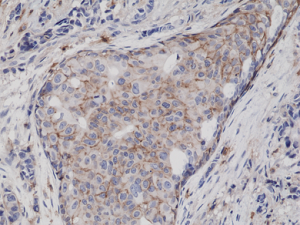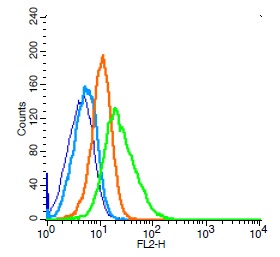
Immunohistochemical staining of formalin fixed and paraffin embedded human breast cancer tissue sections using Anti-CD44 Rabbit Monoclonal Antibody (Clone RM264) at a 1:5000 dilution.
anti-CD44 (human), Rabbit Monoclonal (RM264)
REV-31-1146-00
ApplicationsWestern Blot, ImmunoHistoChemistry
Product group Antibodies
ReactivityHuman
TargetCD44
Overview
- SupplierRevMAb Biosciences
- Product Nameanti-CD44 (human), Rabbit Monoclonal (RM264)
- Delivery Days Customer10
- ApplicationsWestern Blot, ImmunoHistoChemistry
- CertificationResearch Use Only
- ClonalityMonoclonal
- Clone IDRM264
- Gene ID960
- Target nameCD44
- Target descriptionCD44 molecule (IN blood group)
- Target synonymsCDW44, CSPG8, ECM-III, ECMR-III, H-CAM, HCELL, HUTCH-1, HUTCH-I, Hermes-1, LHR, MC56, MDU2, MDU3, MIC4, Pgp1, CD44 antigen, CD44 molecule (Indian blood group), GP90 lymphocyte homing/adhesion receptor, Hermes antigen, In(Lu) related-p80, Indian blood group antigen, cell surface glycoprotein CD44, chondroitin sulfate proteoglycan 8, epican, extracellular matrix receptor III, hematopoietic cell E- and L-selectin ligand, heparan sulfate proteoglycan, homing cell adhesion molecule, homing function and Indian blood group system, hyaluronate receptor, phagocyte glycoprotein 1, phagocytic glycoprotein 1, soluble CD44
- HostRabbit
- IsotypeIgG
- Protein IDP16070
- Protein NameCD44 antigen
- Scientific DescriptionCD44 cell surface antigen is a 100 kDa type 1 transmembrane glycoprotein widely expressed on human leucocytes, white matter of the brain and by some epithelial cells of the intestine and breast. Several isoforms of CD44 exist. CD44 is a receptor for hyaluronic acid (HA) and is involved in cell-cell interactions, cell adhesion and migration. CD44 also participates in a wide variety of cellular functions including including lymphocyte activation, recirculation and homing, hematopoiesis and tumor metastasis. CD44 function is controlled by its posttranslational modifications. CD44 is expressed by hematopoietic, non-hematopoietic cells and epithelial tissues. Further, bone marrow myeloid cells and memory T cells express CD44 at high levels, and peripheral B and T cells can upregulate the expression of CD44 in response to certain stimulatory events. CD44 expression may be up-regulated upon some carcinomas, and it has been speculated that this may be related to metastatic potential. Diseases associated with CD44 dysfunction include superficial keratitis and lichen sclerosus. CD44 also may be related to tumor metastasis formation. - Recombinant Antibody. This antibody reacts to the extracellular domain of human CD44. Applications: WB, IHC. Source: Rabbit. Liquid. 50% Glycerol/PBS with 1% BSA and 0.09% sodium azide. CD44 cell surface antigen is a 100 kDa type 1 transmembrane glycoprotein widely expressed on human leucocytes, white matter of the brain and by some epithelial cells of the intestine and breast. Several isoforms of CD44 exist. CD44 is a receptor for hyaluronic acid (HA) and is involved in cell-cell interactions, cell adhesion and migration. CD44 also participates in a wide variety of cellular functions including including lymphocyte activation, recirculation and homing, hematopoiesis and tumor metastasis. CD44 function is controlled by its posttranslational modifications. CD44 is expressed by hematopoietic, non-hematopoietic cells and epithelial tissues. Further, bone marrow myeloid cells and memory T cells express CD44 at high levels, and peripheral B and T cells can upregulate the expression of CD44 in response to certain stimulatory events. CD44 expression may be up-regulated upon some carcinomas, and it has been speculated that this may be related to metastatic potential. Diseases associated with CD44 dysfunction include superficial keratitis and lichen sclerosus. CD44 also may be related to tumor metastasis formation.
- ReactivityHuman
- Storage Instruction-20°C
- UNSPSC12352203







